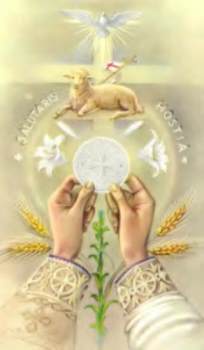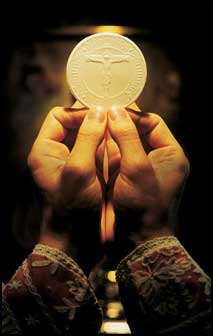Ave Maria Meditations
excerpts from ECCLESIA DE EUCHARISTIA:
On the Eucharist in its relationship to the Church
Encyclical Letter of Pope John Paul II, April 2003
The Church draws her life from the Eucharist. This truth does not simply express a daily experience of faith, but recapitulates the heart of the mystery of the Church. In a variety of ways she joyfully experiences the constant fulfillment of the promise: “Lo, I am with you always, to the close of the age” (Mt 28:20), but in the Holy Eucharist, through the changing of bread and wine into the body and blood of the Lord, she rejoices in this presence with unique intensity…The Second Vatican Council rightly proclaimed that the Eucharistic sacrifice is “the source and summit of the Christian life. For the most holy Eucharist contains the Church’s entire spiritual wealth: Christ himself, our Passover and living Bread. Through his own flesh, now made living and life-giving by the Holy Spirit, he offers life to men”. Consequently the gaze of the church is constantly turned to her Lord, present in the Sacrament of the Altar, in which she discovers the full manifestation of his boundless love.

And so began the introduction to this great encyclical and from the Conclusion we read the following thoughts:
Several years ago I celebrated the fiftieth anniversary of my priesthood. Today…my heart is filled with gratitude. For over a half century, every day…my eyes have gazed in recollection upon the host and the chalice, where time and space in some way “merge” and the drama of Golgotha is re-presented in a living way…Each day my faith has been able to recognize in the consecrated bread and wine the divine Wayfarer who joined the two disciples on the road to Emmaus and opened their eyes to the light and their hearts to new hope. (Lk 24:13-35).

Allow me, dear brothers and sisters, to share with deep emotion, as a means of accompanying and strengthening your faith, my own testimony of faith in the Most Holy Eucharist…Here is the Church’s treasure, the heart of the world, the pledge of the fulfillment for which each man and woman, even unconsciously, yearns.. Here our senses fail us…yet faith alone, rooted in the word of Christ handed down to us by the Apostles, is sufficient for us. Allow me, like Peter at the end of the Eucharistic discourse in John’s Gospel, to say once more to Christ, in the name of the whole Church and in the name of each of you: “Lord to whom shall we go? You have the words of eternal life” (Jn 6:68).
At the dawn of this third millennium, we, the children of the Church, are called to undertake with renewed enthusiasm the journey of Christian living… it is not an inventing a ‘new program’. The program already exists: it is the plan found in the Gospel and in the living Tradition; it is the same as ever. Ultimately, it has its centre in Christ himself, who is to be known, loved and imitated, so that in him we may live the life of the Trinity… the implementation of this program of a renewed impetus in Christian living passes through the Eucharist.
Every commitment to holiness, every activity aimed at carrying out the Church’s mission, every work of pastoral planning, must draw the strength it needs from the Eucharistic mystery and in turn be directed to that mystery as its culmination. In the Eucharist we have Jesus, we have his redemptive sacrifice, we have his resurrection, we have the gift of the Holy Spirit, we have adoration, obedience and love of the Father. Were we to disregard the Eucharist, how could we overcome our own deficiency?
By giving the Eucharist the prominence it deserves, and by being careful not to diminish any of its dimensions or demands, we show that we are truly conscious of the greatness of this gift…In the humble signs of bread and wine, changed into his body and blood, Christ walks beside us as our strength and our food for the journey, and he enables us to become, for everyone, witnesses of hope. If, in the presence of this mystery, reason experiences its limits, the heart, enlightened by the grace of the Holy Spirit, clearly sees the response that is demanded, and bows low in adoration and unbounded love.
Other thoughts on the centrality of the Eucharist in our spiritual life drawn from the encyclical include the following:
The Eucharist, as Christ’s saving presence in the community of the faithful and its spiritual food, is the most precious possession which the Church can have in her journey through history.
The worship of the Eucharist outside of the Mass is of inestimable value for the life of the Church. This worship is strictly linked to the celebration of the Eucharistic Sacrifice…It is pleasant to spend time with him, to lie close to his breast like the Beloved Disciple (cf. Jn 13:25) and to feel the infinite love present in his heart.
If in our time Christians must be distinguished above all by the “art of prayer”, how can we not feel a renewed need to spend time in spiritual converse, in silent adoration, in heartfelt love before Christ present in the Most Holy Sacrament? How often, dear brother and sisters, have I experienced this, and drawn from it strength, consolation and support! Of all devotions, that of adoring Jesus in the Blessed Sacrament is the greatest after the sacraments, the one dearest to God and the one most helpful to us.
Communion…presupposes the life of grace, by which we become “partakers of the divine nature” (2 Pet 1:4), and the practice of the virtues of faith, hope and love. Only in this way do we have true communion with the Father, the Son and the Holy Spirit. Nor is faith sufficient; (There is)a specific moral duty incumbent upon Christians who wish to participate fully in the Eucharist by receiving the body and blood of Christ. The Apostle Paul appeals to this duty when he warns: “Let a man examine himself, and so eat of the bread and drink of the cup.”
Along these same lines, the Catechism of the Catholic Church rightly stipulates that “anyone conscious of a grave sin must receive the sacrament of Reconciliation before coming to communion”. I therefore desire to reaffirm that in the Church there remains in force, now and in the future. The two sacraments of the Eucharist and Penance are very closely connected. Because the Eucharist makes present the redeeming sacrifice of the Cross, perpetuating it sacramentally, it naturally gives rise to a continuous need for conversion, for a personal response… The judgment of one’s state of grace obviously belongs only to the person involved, since it is a question of examining one’s conscience.
If we wish to rediscover in all its richness the profound relationship between the Church and the Eucharist, we cannot neglect Mary, Mother and model of the Church…the Blessed Virgin Mary as our teacher in contemplating Christ’s face…Mary can guide us towards this most holy sacrament, because she herself has a profound relationship with it.


